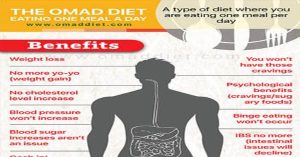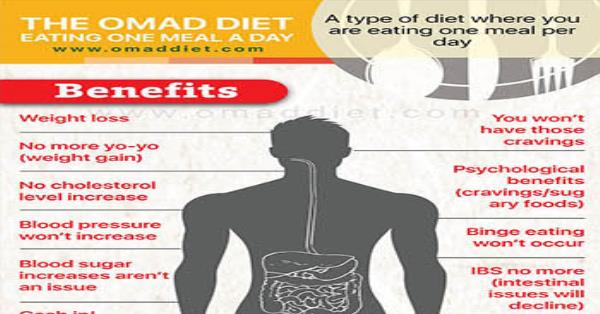
Introduction: Unveiling Health Outcomes on the OMAD Diet
The OMAD (One Meal a Day) diet, known for its intermittent fasting pattern, offers potential health benefits but also carries inherent risks. This article delves into the health advantages, including weight loss and improved insulin sensitivity, alongside potential risks like nutrient deficiencies, disrupted eating patterns, and metabolic implications associated with the OMAD diet.
Understanding the OMAD Diet’s Health Benefits
Exploring the potential benefits of the OMAD diet, including weight loss due to caloric restriction, improved insulin sensitivity, and metabolic adaptations triggered by intermittent fasting.

Weight Loss and Metabolic Changes
Elucidating the mechanisms behind weight loss on the OMAD diet, discussing metabolic changes, increased fat oxidation, and hormonal responses contributing to fat loss.
Improved Insulin Sensitivity and Blood Sugar Regulation
Examining how intermittent fasting, as practiced in the OMAD diet, influences insulin sensitivity, blood sugar levels, and its potential implications for metabolic health.
Potential Risks and Drawbacks
Addressing the potential risks associated with the OMAD diet, including nutrient deficiencies due to limited food intake, disrupted eating patterns, and challenges in meeting daily nutritional requirements.
Nutrient Deficiencies and Dietary Concerns
Discussing the risk of nutrient deficiencies, especially when consuming a single meal, and strategies to mitigate these deficiencies through careful meal planning and nutrient-dense food choices.
Disrupted Eating Patterns and Social Implications
Highlighting the impact of the OMAD diet on eating patterns, potential social challenges, and the need for mindfulness to prevent disordered eating behaviors or social discomfort.
Metabolic Adaptations and Individual Variations
Exploring individual variations in metabolic responses to the OMAD diet, acknowledging that the effects may vary based on an individual’s physiology and lifestyle factors.
Long-term Sustainability and Health Considerations
Assessing the long-term sustainability of the OMAD diet, addressing concerns about its feasibility, potential risks of metabolic adaptations, and its suitability for diverse individuals.
Guidance and Recommendations
Offering guidance and recommendations for individuals considering or practicing the OMAD diet, emphasizing the importance of balanced nutrition, regular health monitoring, and seeking professional guidance.

Conclusion: Balancing Health Outcomes on the OMAD Diet
In conclusion, the OMAD diet presents potential health benefits such as weight loss and improved insulin sensitivity. However, it also poses risks like nutrient deficiencies and disrupted eating patterns. Understanding these outcomes helps individuals navigate the OMAD diet for optimized health.










